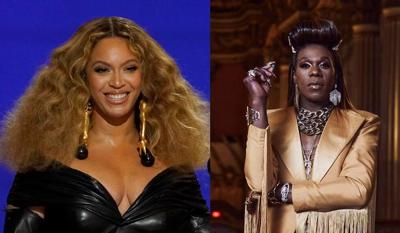Did Big Freedia and Beyonce steal their “wiggle” from an obscure New Orleans bounce group?
That’s the allegation made in a copyright infringement lawsuit filed Wednesday in federal court for the Eastern District of Louisiana.
The plaintiffs are the four members of Da Showstoppaz, a group that was briefly active on the New Orleans bounce music scene in the early 2000s. In the summer of 2002, Da Showstoppaz – Tessa Avie, Keva Bourgeois, Henri Braggs and Brian Clark – released a song called “Release A Wiggle” via a mixtape compilation.
Freedia’s 2014 album “Just Be Free” featured a song called “Explode” in which Freedia repeats the phrase “release yo wiggle.” According to the suit, Freedia’s phrase is “interchangeable” with Da Showstoppaz’ “wiggle” phrase and is thus an infringement of Da Showstoppaz’ copyright.
Beyonce subsequently sampled “Explode” for her single “Break My Soul,” from the 2022 album “Renaissance." That, the suit contends, also makes Beyonce guilty of copyright infringement.
The 53-page lawsuit names 16 defendants, a mix of individuals and entertainment, publishing and insurance companies.
Beyonce is the first defendant named, followed by her Parkwood Entertainment LLC and Sony Music. Her husband, Shawn “Jay-Z” Carter, who is credited as a writer on "Break My Soul," is also named in the suit. So, too, is New Orleans bounce producer Adam “BlaqNmilD” Pigott, who produced "Explode." Big Freedia is named as Freddie Ross Jr.
Defendants, according to the suit, “have not acknowledged their contribution, obtained permission to use their copyrighted lyrics, melody, and musical arrangement, nor provided compensation to Da Showstoppaz.”
The lawsuit seeks credit for co-writing “Explode” and “Break My Soul,” as well as unspecified financial compensation.
If successful, the suit would provide the four plaintiffs with what would amount to an enormous bonus for working at the Esplanade Mall’s Taco Bell.
That, according to the timeline laid out in the lawsuit, is where Bourgeois and Avie first met in 2001. They then met Clark, who worked at the Wendy’s franchise next door.
They met Braggs later. When, in 2002, a burgeoning local music entrepreneur named Norris Revader asked Bourgeois to contribute a song to a mixtape, she enlisted her friends. They christened themselves Da Showstoppaz.
The lawsuit says that Bourgeois came up with the hook “release a wiggle” while working at the Taco Bell. She and the others then fleshed out a full song.
Days later, they recorded it at a studio in an apartment in New Orleans East. Revader was present at the recording session and was given the final version of the son.
However, the musicians didn’t sign any contracts with Revader. “Grateful for an opportunity to showcase their song, and in their excitement, Plaintiffs did not request any documentation or paperwork. In fact, no paperwork or contracts were ever signed or exchanged,” according to the lawsuit.
“Release a Wiggle” appeared on a mixtape called “Fire On Da Bayou Vol. 1” that was released by Black House Entertainment. The suit says this was the first time the phrases “release a wiggle” and “release ya wiggle” had ever appeared on a commercially available recording.
The song turned up on club sound systems and at block parties throughout New Orleans, but was not popular enough to sustain Da Showstoppaz.
By 2004, the group had broken up, and its members quit the music business.
A decade later, on March 2, 2014, Bourgeois uploaded “Release a Wiggle” to her YouTube channel, which she used primarily to showcase tips about makeup and wigs.
On June 17, 2014, Freedia’s major-label debut album, “Just Be Free,” dropped; it featured “Explode” and its “wiggle” reference.
Earlier Freedia recordings had appeared on a Black House Entertainment compilation, so Freedia was likely to have heard Da Showstoppaz’s “Release a Wiggle,” the suit contends.
A sample of “Explode” is featured prominently in Beyonce’s “Break My Soul”; within the song’s first 20 seconds, Freedia can be heard repeating “release yo wiggle.”
That, say Da Showstoppaz, means Beyonce owes them as well.
“For their part in creating the now-iconic catch phrase ‘release a/yo wiggle,’ Plaintiffs were denied the worldwide acclaim, popularity, recognition, and revenue earned by Defendants,” the suit says.
The plaintiffs are represented by Shermin S. Khan of the Khan Law Firm of New Orleans and Abid M. Hussain of Hussain Law LLC of Metairie.
A manager who represents Big Freedia did not respond to an email seeking comment.

